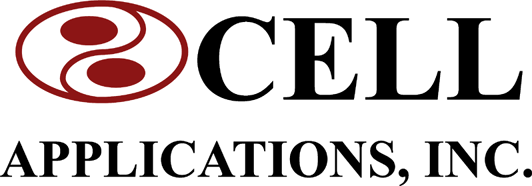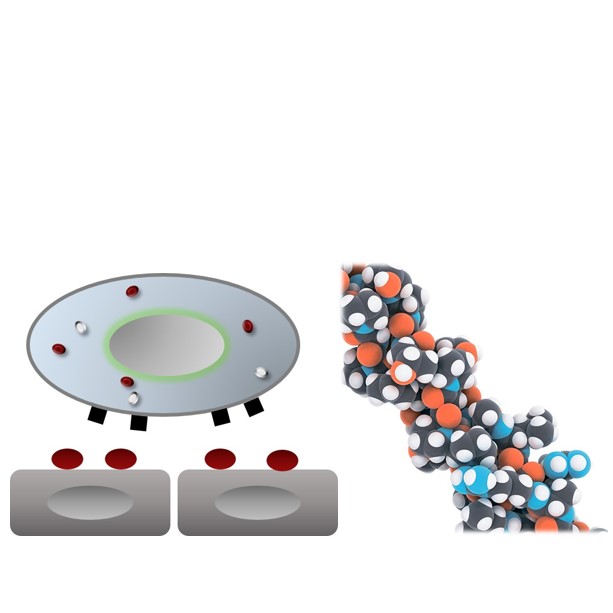MSDS 027-05
MSDS 029-05
MSDS 120-25
MSDS 120-100
MSDS 122-20
MSDS 123-100
MSDS 124-25
MSDS 124-100
MSDS 125-50
MSDS 125-75
MSDS 125-100
MSDS 126-2.5
MSDS 126-100
MSDS 126XF-100
MSDS 127-2.5
Description
Cells adhere to one another and to the extracellular matrix durinig normal physiology and development, but also in pathological conditions such as chronic inflammation and tumor metastasis.
For example, during extravasation from blood vessels into the tissue space, leukocytes first weakly adhere to and roll upon vascular endothelial cells via cell surface receptors known as selectins. Subsequent, stronger adhesion ensues using other receptors and ligands, such as LFA-1 and ICAM-1. Transendothelial migration follows, where the leukocytes squeeze between the tight endothelial cell junctions. As a final impediment to entering the tissue space, the leukocytes encounter the basement membrane, a mixture of extracellular components that ensheathes the vessel. The leukocytes utilize still other receptors to bind ECM, and also secrete matrix-degrading enzymes to facilitate their passage. Unfortunately, tumor cells utilze a similar mechanism as they spread to distant parts of the body during metastasis.
Organs and tissues of the body also contain extensive networks of extracellular matrix, acting as structural scaffolding and regulating cell adhesion, migration and behavior. Finally certain cells, when cultured in vitro, behave more robustly when adhering to a cell culture vessel coated with an ECM analog, component or other attachment factor. Thus, the study of cell adhesion remains an area of particular interest to cell biologists.
Details
| Attachment Factor Solution | |
| Components: | Bovine Gelatin |
| Cell Types: | Various, especially Endothelial Cells (Required for microvascular ECs) |
| Applications: | Promotes attachment and spreading of endothelial cells |
| Collagen Coated T-75 Flask | |
| Components: | Bovine Collagen |
| Cell Types: | Various, including HFDPC |
| Applications: | For attachment and spreading of cells |
| Collagen Coating Solution | |
| Components: | Bovine Collagen |
| Cell Types: | Various |
| Applications: | For coating plates, flasks and dishes to promote cell attachment |
| EHS Matrix Extract (with and w/out Phenol Red) | |
| Componenets | Heterogeneous mix of extracellular matrix / basement membrane components: Laminin, entactin, collagen, HSPG, growth factors extracted from mouse Engelbreth-Holm-Swarm tumor |
| Cell Types: | Various |
| Applications: | For culturing cells where adhesion is dependent upon ECM-coated surface |
| Extracellular Matrix Attachment Factor Solution | |
| Components: | Bovine Fibronectin & Gelatin |
| Cell Types: | Various, especially Endothelial Cells |
| Applications: | Promotes cell attachment & spreading. Prevents endothelial cell monolayer from peeling under shear stress. |
| Extracellular Matrix Protein Coated T-25 flasks | |
| Components: | Bovine Fibronectin & Gelatin |
| Cell Types: | Various, especially Endothelial Cells |
| Applications: | For culturing cells where adhesion is dependent upon ECM-coated surface |
| Neuron Coating Solution I | |
| Components: | Poly-D-Lysine |
| Cell Types: | Neurons |
| Applications: | For the coating of cell cultureware to enhance adhesion |
| Neuron Coating Solution II | |
| Components: | Poly-D-Lysine |
| Cell Types: | Neurons, especially RDRGN & HBN |
| Applications: | For the coating of cell cultureware to enhance adhesion |
| Poly-D-Lysine & Laminin | |
| Components: | Poly-D-Lysine, Mouse Laminin |
| Cell Types: | Various |
| Applications: | For culturing cells where adhesion is dependent upon ECM-coated surface |
| Rat Tail Collagen Coating Solution | |
| Components: | Rat Tail Collagen |
| Cell Types: | Various, especially Endothelial Cells, Hepatocytes, Muscle Cells |
| Applications: | For coating plates, flasks and dishes to promote cell attachment |
| Rat Tail Collagen Solution | |
| Components: | Rat Tail Collagen |
| Cell Types: | Various, especially Endothelial Cells, Hepatocytes, Muscle Cells |
| Applications: | Enhances cell attachment and proliferation, or promotion of cell-specific morphology and function |
Need help choosing? See our Media Selection Guide
Products
| Product | Size | CAT.# | Price | Quantity |
|---|---|---|---|---|
| Bovine Collagen Coating Solution: Bovine Collagen | Size: 50 ml | CAT.#: 125-50 | Price: $48.00 | |
| Attachment Factor Solution (AFS): AFS, contains Bovine Gelatin | Size: 100 ml | CAT.#: 123-100 | Price: $24.00 | |
| Rat Tail Collagen Coating Solution: Type I Collagen | Size: 20 ml | CAT.#: 122-20 | Price: $34.00 | |
| ECM Attachment Factor Solution: ECM AFS, contains Bovine Fibronectin & Gelatin | Size: 25 ml | CAT.#: 120-25 | Price: $68.00 | |
| ECM Attachment Factor Solution: ECM AFS, contains Bovine Fibronectin & Gelatin | Size: 100 ml | CAT.#: 120-100 | Price: $245.00 | |
| ECM Protein Coated T-25 Flasks: ECM attachment factor | Size: 2 Flasks | CAT.#: 121-25-02 | Price: $39.00 | |
| ECM Protein Coated T-25 Flasks: ECM attachment factor | Size: 10 Flasks | CAT.#: 121-25-10 | Price: $150.00 | |
| Attachment Factor Solution (AFS): AFS, contains Bovine Gelatin | Size: 500 ml | CAT.#: 123-500 | Price: $92.00 | |
| Bovine Collagen Coating Solution: Bovine Collagen | Size: 100 ml | CAT.#: 125-100 | Price: $95.00 | |
| Bovine Collagen Coated T-75 Flask: Bovine Collagen | Size: 1 Flask | CAT.#: 125-75 | Price: $34.00 | |
| Poly-D-Lysine & Laminin: PDL & mouse laminin, for cell attachment | Size: 2.5 ml | CAT.#: 127-2.5 | Price: $89.00 | |
| Neuron Coating Solution I: Poly-D-Lysine coating for neurons | Size: 5 ml | CAT.#: 027-05 | Price: $20.00 | |
| Neuron Coating Solution II: Poly-D-Lysine and Laminin coating solution for neurons, especially RDGRN and HBN. | Size: 5 ml | CAT.#: 029-05 | Price: $34.00 | |
| HiPSC Coating Solution: EHS Matrix Extract, pre-diluted and ready-to-use for coating tissue culture ware | Size: 100 ml | CAT.#: 126-100 | Price: $50.00 | |
| HiPSC Coating Solution, Xeno-Free: Truncated Vitronectin, no animal components, pre-diluted and ready-to-use for coating tissue culture ware | Size: 100 ml | CAT.#: 126XF-100 | Price: $193.00 | |
| Neuron Coating Solution I: Poly-D-Lysine coating for neurons | Size: 10 ml | CAT.#: 027-10 | Price: $40.00 | |
| Neural Stem Cell Differentiation Coating Solution B: Coating Solution B used specifically for the differentiation of neural stem cells, such as HNSC and i-HNSC. | Size: 10 ml | CAT.#: 035-10 | Price: $58.00 |
Extended Family Products
| Product | Size | CAT.# | Price | Quantity |
|---|---|---|---|---|
| Neural Stem Cell Differentiation Coating Solution A: Coating Solution A used specifically for the differentiation of neural stem cells, such as HNSC and i-HNSC. | Size: 10 ml | CAT.#: 034-10 | Price: $58.00 |
Resources/Documents
Publications
2017
Meyers, M., J. Rink, Q. Jiang, M. Kelly, J. Vercammen, C. Thaxton and M. Kibbe. 2017. Systemically administered collagen‐targeted gold nanoparticles bind to arterial injury following vascular interventions. Physiological Reports, 5:e13128.
2016
González-Miguel, J., C. Larrazabal, D. Loa-Mesón, M. Siles-Lucas, F. Simón and R. Morchón. 2016. Glyceraldehyde 3-phosphate dehydrogenase and galectin from Dirofilaria immitis participate in heartworm disease endarteritis via plasminogen/plasmin system. Veterinary Parasitology, 223:96-101.
Suzuki, T., T. Aoyama, N. Suzuki, M. Kobayashi, T. Fukami, Y. Matsumoto and K. Tomono. 2016. Involvement of a proton-coupled organic cation antiporter in the blood–brain barrier transport of amantadine. Biopharmaceutics & Drug Disposition, 37:323-335.
2015
Colacino, K., C. Arena, S. Dong, M. Roman, R. Davalos and Y. Lee. 2015. Folate Conjugated Cellulose Nanocrystals Potentiate Irreversible Electroporation-induced Cytotoxicity for the Selective Treatment of Cancer Cells. Technol Cancer Res Treat, 14:757-766.
González-Miguel, J., R. Morchón, E. Carretón, J. Montoya-Alonso and F. Simón. 2015. Can the activation of plasminogen/plasmin system of the host by metabolic products of Dirofilaria immitis participate in heartworm disease endarteritis? Parasites & Vectors, 8:194.
Kim, S., E. Choi, H. Lee, C. Moon, and E. Kim. 2015. Transthyretin as a new transporter of nanoparticles for receptor-mediated transcytosis in rat brain microvessels. Colloids and Surfaces B: Biointerfaces, 136:989-996.
2014
Camós, S., C. Gubern, M. Sobrado, R. Rodriguez, V. Romera, M. Moro, I. Lizasoain, J. Serena, J. Mallolas and M. Castellanos. 2014. The high-mobility group I-Y transcription factor is involved in cerebral ischemia and modulates the expression of angiogenic proteins. Neuroscience, 269:112-130.
Carver, K., D. Lourim, A. Tryba and D. Harder. 2014. Rhythmic expression of cytochrome P450 epoxygenases CYP4x1 and CYP2c11 in the rat brain and vasculature. Am J Physiol – Cell Physiol, 307:C989-C998.
Quinn, M., M. McMillin, C. Galindo, G. Frampton, H. Pae and S. DeMorrow. 2014. Bile acids permeabilize the blood brain barrier after bile duct ligation in rats via Rac1-dependent mechanisms. Digestive and Liver Disease, 46:527-534.
Uzer, G., S. Pongkitwitoon, C. Ian, W. Thompson, J. Rubin, M. Chan, and S. Judex. 2014. Gap junctional communication in osteocytes is amplified by Low intensity vibrations in vitro. PLoS ONE, March 10.
2012
DeCoster, M., J. McNamara, K. Cotton, D. Green, C. Jeyasankar, R. Idowu, K. Evans, Z. Xing, and Y. Lvov. Bionanocomposites for multidimensional Brain Cell signaling. Ch. 8. In Thomas, S., N. Ninan, S. Mohan, and E. Francis. 2012. Natural Polymers, Biopolymers, Biomaterials, Composites, Blends, and IPNS. Advances in Materials Science, Volume 2.
Liu, B. 2012. The role of GRK2 in hypertension and regulation of GPR30. MS Thesis, University of Western Ontario.
Naughton, G., J. Mansbridge, R. Pinney, and J. Zeltinger. 2012. Methods for using a three-dimensional stromal tissue to promote angiogenesis. Patent US 8128924 B2.
Uzer, G. 2012. Role of Fluid Shear Modulation on Bone Cell Metabolism during High- Frequency Oscillatory Vibrations. PhD Dissertation, Stony Brook U.
2010
Sheikh-Ali, M., S. Sultan, A.-R. Alamir, M.J. Haas, and A.D. Mooradian. 2010a. Effects of antioxidants on glucose-induced oxidative stress and endoplasmic reticulum stress in endothelial cells. Diabetes research and clinical practice. 87:161-166.
Sheikh-Ali, M., S. Sultan, A.-R. Alamir, M.J. Haas, and A.D. Mooradian. 2010b. Hyperglycemia-induced endoplasmic reticulum stress in endothelial cells. Nutrition. 26:1146-1150.
2009
Hendriks-Balk, M., J. Unen, H. Burt, and J. Butler. 2009. Extracellular S1P disappearance: effect on signalling potency. Source: Balk, M. 2009. Regulation of cardiovascular GPCR signaling. PhD Thesis, U Amsterdam.

